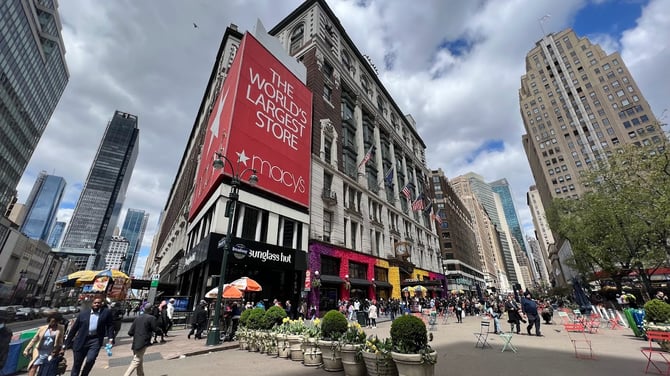It bills itself as the biggest store in the world, but for 2024 Macy’s could be the biggest question mark for companies that supply and compete against it as a reported bid for the department store plays out in the new year.
Late last year a report surfaced that two private equity firms were making a play for Macy’s, proposing to take it private under their ownership and most probably making significant changes in its structure, particularly its real estate. Later on came a second speculative report that another equity company, Sycamore Partners – which owns Belk and several specialty retail – was also eying the company.

And while it’s important to note neither the first reported buyers – Arkhouse Management and Brigade Capital Management – nor Macy’s itself had confirmed any of this, Wall Street investors clearly believe something is up, driving the company stock price up more than 7% over the past 45 days. Often in takeover cases like this, the first buyers may not eventually be the final ones but once a company is in play it often ends up changing hands.
Should that happen in 2024, we would likely see significant changes in the company. Buyers are most interested in the Macy’s real estate, particularly the flagship Herald Square store, which is rumored to be worth $1 billion by itself. That store would not likely close but could be part of a new complex that might include residential or commercial office space in a larger tower at the major Manhattan crossroads.
But other locations in Macy’s 600-plus-store footprint might end up going away, particularly secondary and tertiary stores in B and C mall locations. Macy’s other nameplates, like Bloomingdale’s and Blue Mercury, could also be spun off to bring in financial benefits for the new owners.
For competitors located in these malls, the closing of an anchor could have a major negative effect on smaller retailers. Those that survived might pick up former Macy’s business but usually that’s not the case when retailers shut down locations.
For suppliers, a smaller Macy’s would of course mean smaller orders and perhaps tougher terms when they are dealing with hard-nosed private equity owners. Merchandising staffs are also usually reduced in situations like this, meaning more difficult buyer-seller relationships.
And despite all the speculation, it’s quite possible nothing actually comes to pass. Past suitors have been rebuffed and these new rumors might not pan out. In that case it could be business as usual for Macy’s.
One change that will most certainly happen is that Macy’s will have a new CEO come later this winter. Current leader Jeff Gennette is retiring and is being succeeded by Tony Spring, who had been president of Bloomingdale’s. As a company lifer, we are not likely to see radical changes in the overall company but sometimes you never know. While Gennette largely continued the Macy’s course, his predecessor Terry Lundgren – another long-time company executive – made serious changes, including buying rival May Co. and rebranding all of the combined company’s stores under the Macy’s brand.
So, 2024 could be a consequential year for Macy’s – and for those who both do business with and against it – however things turn out.

